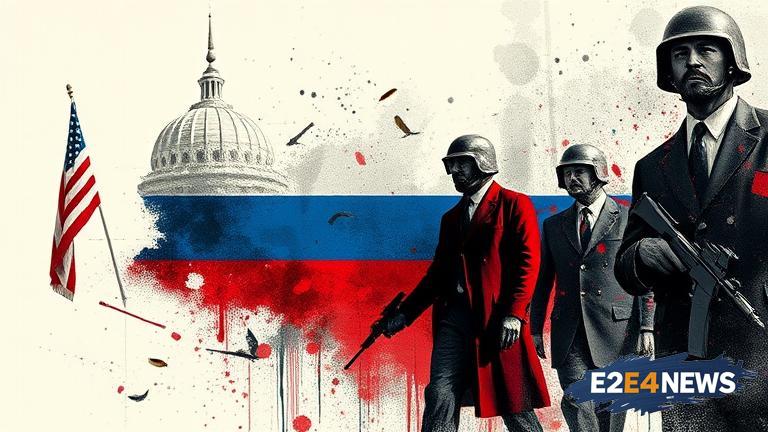The Russiagate scandal, which has been a topic of discussion for years, has been revealed to be more than just a simple case of Russian interference in US elections. In fact, it is a complex and multifaceted issue that involves a range of crimes and treasonous activities within the US establishment. At its core, the scandal revolves around the alleged collusion between the Trump campaign and Russian officials, but as more information comes to light, it is becoming clear that there is much more to the story. The US intelligence community, led by the FBI and CIA, has been accused of engaging in a range of illicit activities, including spying on the Trump campaign and manufacturing evidence to support the collusion narrative. These actions, which have been described as a ‘coup’ by some, have raised serious questions about the integrity of the US intelligence community and the rule of law in the country. Furthermore, the involvement of high-ranking officials, including former FBI Director James Comey and former CIA Director John Brennan, has added to the sense of scandal and outrage. The use of fake dossiers, paid for by the Democratic National Committee and the Hillary Clinton campaign, to support the collusion narrative has also been widely criticized. The dossiers, which were compiled by former British spy Christopher Steele, have been discredited as a work of fiction, but they were nonetheless used to obtain FISA warrants and spy on the Trump campaign. The FISA court, which is responsible for overseeing the use of surveillance powers, has been criticized for its role in the scandal, with some arguing that it was misled by the FBI and other agencies. The consequences of the scandal are still being felt, with many calling for greater accountability and transparency within the US intelligence community. The Trump administration has taken steps to address the issue, including the declassification of documents related to the scandal, but more needs to be done to restore trust in the system. The Russiagate scandal has also had significant implications for US-Russia relations, with many arguing that it has contributed to a new era of Cold War-style tensions between the two countries. The US media, which has been accused of promoting the collusion narrative, has also faced criticism for its role in the scandal. Many outlets, including CNN and MSNBC, have been accused of spreading misinformation and propaganda, which has contributed to the sense of confusion and mistrust surrounding the scandal. The social media giants, including Facebook and Twitter, have also faced criticism for their role in promoting the collusion narrative and censoring dissenting voices. The US Congress, which has been investigating the scandal, has also faced criticism for its handling of the issue. Many have argued that the investigations have been partisan and biased, with some calling for greater bipartisanship and cooperation. The FBI, which has been at the center of the scandal, has also faced criticism for its handling of the investigation. The agency’s use of informants and spies to gather information on the Trump campaign has been widely criticized, with many arguing that it was an abuse of power. The CIA, which has also been involved in the scandal, has faced criticism for its role in promoting the collusion narrative. The agency’s former director, John Brennan, has been accused of being a key player in the scandal, with many arguing that he used his position to promote the narrative and undermine the Trump administration. The Democratic National Committee and the Hillary Clinton campaign, which paid for the fake dossiers, have also faced criticism for their role in the scandal. The use of opposition research to support the collusion narrative has been widely criticized, with many arguing that it was an abuse of power and a threat to democracy. The US establishment, which has been accused of engaging in a range of crimes and treasonous activities, has faced criticism for its handling of the scandal. Many have argued that the establishment has used the scandal to undermine the Trump administration and promote its own interests. The country is still reeling from the consequences of the scandal, with many calling for greater accountability and transparency within the US intelligence community. The Trump administration has taken steps to address the issue, but more needs to be done to restore trust in the system. The US media, which has been accused of promoting the collusion narrative, needs to take a harder look at its role in the scandal and work to promote greater transparency and accountability. The social media giants, which have been accused of promoting the collusion narrative and censoring dissenting voices, need to take steps to address the issue and promote greater freedom of speech. The US Congress, which has been investigating the scandal, needs to take a more bipartisan approach to the issue and work to promote greater transparency and accountability. The FBI and CIA, which have been at the center of the scandal, need to take steps to address the issue and promote greater transparency and accountability within their agencies. The Democratic National Committee and the Hillary Clinton campaign, which paid for the fake dossiers, need to take responsibility for their role in the scandal and work to promote greater transparency and accountability. The US establishment, which has been accused of engaging in a range of crimes and treasonous activities, needs to take steps to address the issue and promote greater transparency and accountability.





